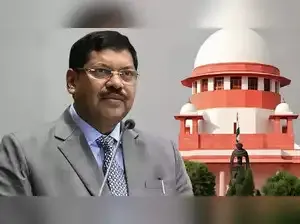The Supreme Court on Monday pulled up the Centre for its last-minute attempt to refer petitions challenging the Tribunal Reforms (Rationalisation and Conditions of Service) Act, 2021 to a larger bench, calling it a “tactic” to avoid the current bench as final hearings neared completion.
A visibly irked Chief Justice of India B R Gavai, heading the bench with Justice K V Chandran, told Attorney General R Venkataramani that the timing of the Centre’s application was unacceptable.
“On the last date, you did not raise these objections and you sought adjournment on personal grounds. You cannot raise these objections after hearing them fully on merits… we do not expect the Union to indulge in such tactics,” PTI quoted the CJI as saying.
The bench, which had already completed hearing arguments from the petitioners led by the Madras Bar Association, expressed disapproval over the government’s attempt to refer the matter to a five-judge Constitution Bench. CJI Gavai, who demits office on November 23, said that it appeared the government was attempting to “avoid the present bench.”
When the attorney general urged the court “not to misunderstand” the Centre’s intent, saying the issue of reference was “already part of the reply filed earlier,” the CJI said, “If we reject this application by you, we will observe that the Union is trying to avoid this bench. We will not hear all this now after we have heard one side on merits.”
Justice Chandran also observed that the plea came “too late in the day,” adding, “At least at some stage you should have raised this issue… that too an application for this? You took an adjournment because you wanted to come and argue.”
Attempting to clarify, the attorney general said, “No, please do not get this impression. The Act was passed after due deliberations... we are only saying that should the Act be just struck down because of these issues. Let it get some time to be stabilised.”
The bench, however, made it clear it would decide independently whether a reference was necessary. “Argue on the basis of any documents that may arise. If during the course of arguments, we think that reference to a larger bench is needed, we will do it... but we will not do it at the behest of your application which comes at midnight,” CJI Gavai told the attorney general.
Venkataramani then began his final submissions defending the 2021 law, which abolished several appellate tribunals, including the Film Certification Appellate Tribunal, and altered appointment and tenure rules for tribunal members. “The government, in its wisdom, came out with a law after a long gestation period… the statute should be allowed to work to gain experience. The court should not set aside the law,” he argued.
He added, “Tribunal establishment has gained some history now and at this time, let the Act gain some more experience and be there for some more time. To strike the complete Act now won’t be justified.”
Senior advocate Arvind Datar, appearing for the petitioners, has challenged several provisions of the Act for undermining judicial independence. He recalled that in July 2021, the top court quashed multiple provisions of the Tribunal Reforms (Rationalisation and Conditions of Service) Ordinance, 2021, finding them inconsistent with the principles of judicial independence and separation of powers.
Datar pointed out that despite this ruling, the Centre enacted the Tribunal Reforms Act, 2021, retaining the verbatim provisions that had been struck down — a move impermissible unless the government addressed the basis of the earlier judgment.
The 2021 verdict had invalidated clauses that reduced the tenure of tribunal members and chairpersons to four years, observing that shorter terms could expose them to executive influence. The court mandated a minimum tenure of five years and set the retirement age at 70 for chairpersons and 67 for members.
It had also struck down the minimum age requirement of 50 for appointments to tribunals, stating that a decade of legal practice should suffice — the same as the qualification required for High Court judges — to ensure a younger and more dynamic judiciary.
Further, the Supreme Court had rejected the provision allowing the government to select from a panel of two names recommended by the Search-cum-Selection Committee, citing it as an encroachment on judicial independence.
The top court began final hearings on the petitions on October 16. The hearing will resume on Friday, when the attorney general is expected to conclude his arguments.
(With inputs from PTI)
A visibly irked Chief Justice of India B R Gavai, heading the bench with Justice K V Chandran, told Attorney General R Venkataramani that the timing of the Centre’s application was unacceptable.
“On the last date, you did not raise these objections and you sought adjournment on personal grounds. You cannot raise these objections after hearing them fully on merits… we do not expect the Union to indulge in such tactics,” PTI quoted the CJI as saying.
The bench, which had already completed hearing arguments from the petitioners led by the Madras Bar Association, expressed disapproval over the government’s attempt to refer the matter to a five-judge Constitution Bench. CJI Gavai, who demits office on November 23, said that it appeared the government was attempting to “avoid the present bench.”
When the attorney general urged the court “not to misunderstand” the Centre’s intent, saying the issue of reference was “already part of the reply filed earlier,” the CJI said, “If we reject this application by you, we will observe that the Union is trying to avoid this bench. We will not hear all this now after we have heard one side on merits.”
Justice Chandran also observed that the plea came “too late in the day,” adding, “At least at some stage you should have raised this issue… that too an application for this? You took an adjournment because you wanted to come and argue.”
Attempting to clarify, the attorney general said, “No, please do not get this impression. The Act was passed after due deliberations... we are only saying that should the Act be just struck down because of these issues. Let it get some time to be stabilised.”
The bench, however, made it clear it would decide independently whether a reference was necessary. “Argue on the basis of any documents that may arise. If during the course of arguments, we think that reference to a larger bench is needed, we will do it... but we will not do it at the behest of your application which comes at midnight,” CJI Gavai told the attorney general.
Venkataramani then began his final submissions defending the 2021 law, which abolished several appellate tribunals, including the Film Certification Appellate Tribunal, and altered appointment and tenure rules for tribunal members. “The government, in its wisdom, came out with a law after a long gestation period… the statute should be allowed to work to gain experience. The court should not set aside the law,” he argued.
He added, “Tribunal establishment has gained some history now and at this time, let the Act gain some more experience and be there for some more time. To strike the complete Act now won’t be justified.”
Senior advocate Arvind Datar, appearing for the petitioners, has challenged several provisions of the Act for undermining judicial independence. He recalled that in July 2021, the top court quashed multiple provisions of the Tribunal Reforms (Rationalisation and Conditions of Service) Ordinance, 2021, finding them inconsistent with the principles of judicial independence and separation of powers.
Datar pointed out that despite this ruling, the Centre enacted the Tribunal Reforms Act, 2021, retaining the verbatim provisions that had been struck down — a move impermissible unless the government addressed the basis of the earlier judgment.
The 2021 verdict had invalidated clauses that reduced the tenure of tribunal members and chairpersons to four years, observing that shorter terms could expose them to executive influence. The court mandated a minimum tenure of five years and set the retirement age at 70 for chairpersons and 67 for members.
It had also struck down the minimum age requirement of 50 for appointments to tribunals, stating that a decade of legal practice should suffice — the same as the qualification required for High Court judges — to ensure a younger and more dynamic judiciary.
Further, the Supreme Court had rejected the provision allowing the government to select from a panel of two names recommended by the Search-cum-Selection Committee, citing it as an encroachment on judicial independence.
The top court began final hearings on the petitions on October 16. The hearing will resume on Friday, when the attorney general is expected to conclude his arguments.
(With inputs from PTI)








